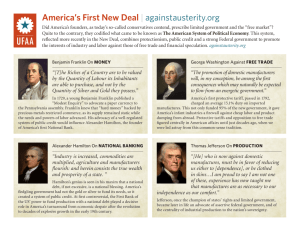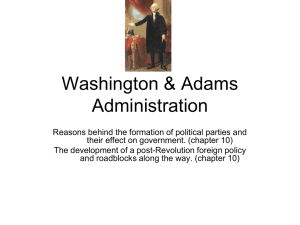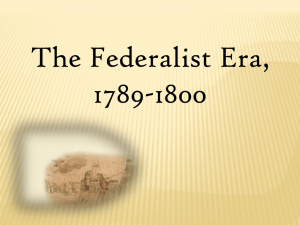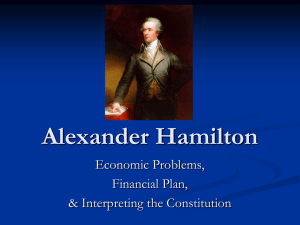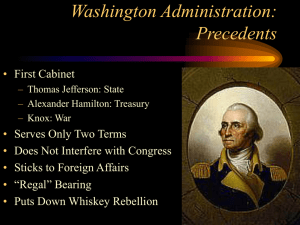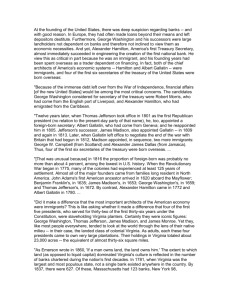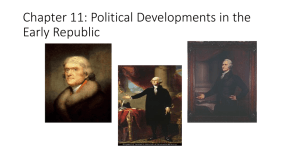The Early Republic
advertisement
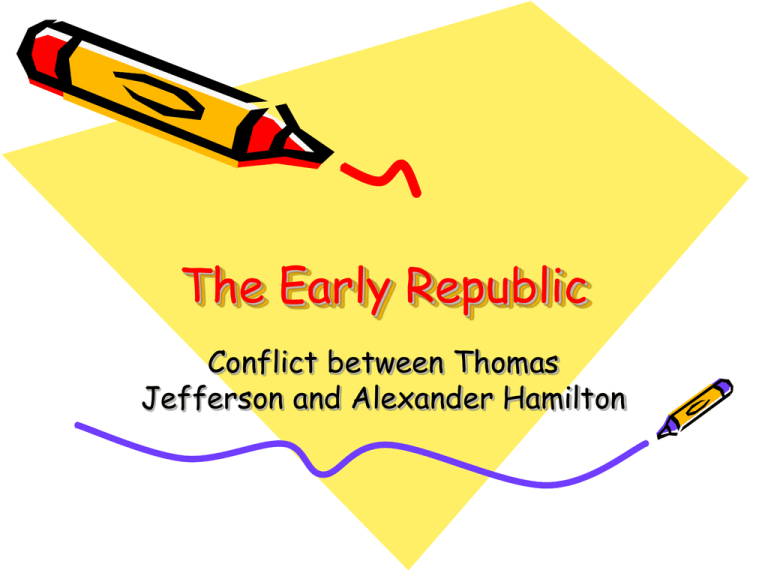
The Early Republic Conflict between Thomas Jefferson and Alexander Hamilton The Early Republic • • • • • Chronology: 1776 – Declaration of Independence 1781 – Articles of Confederation 1789 – Federal Constitution 1791 – Bill of rights added to the Constitution Thomas Jefferson • Author of the Declaration of independence • Secretary of State in President Washington’s Cabinet • Believed in a loose interpretation of the constitution. Alexander Hamilton • Delegate to the Constitutional Convention • Was Secretary of the Treasury in George Washington’s Cabinet • Favored a loose interpretation of the Constitution. George Washington • Became the fist chief executive of the new Republic. • Put his stamp on the new government by creating the presidents Cabinet • Sided with Hamilton more than Jefferson. Conflict • Alexander Hamilton favored that the national government assume the debts of the states. • To pay the debt he wanted an excise tax, and tariffs and establish a national bank. • He wanted the nations’ capital to be established in Philadelphia or new York. Conflict • Thomas Jefferson wanted the states to be responsible for their own debt. • He and other southerners wanted the capital to be located in the South. • Thomas Jefferson opposed creation of a national bank because there was nothing about it in the Constitution. Compromise • The national capital would be located in the South after moving from New York to Philadelphia to a place to be chosen at a future time. • In return the Southern interests would support the assumption of all debts by the national government. Break • Alexander Hamilton pushes for the creation of a National Bank, based on the idea that a national bank is one way to control commerce. • When President Washington supports Alexander Hamilton over the objects of Thomas Jefferson, he resigns from the Cabinet. Alexander Hamilton’s Views • Democracy: • The best course for the United States is government by an aristocracy. • The Federal Government: • A powerful federal government is necessary to ensure the peace and liberty of the states. Alexander Hamilton’s Views • The Economy: • Government should encourage the growth of cities, manufacturing, and shipping. Tariffs are necessary to protect American industry. The federal government should assume state debts and establish a national bank. A national debt, if not large can aid the economy. Alexander Hamilton’s Views • The President and Congress: • The President should serve in office for life. A lifetime senate should be recruited only from men of property. • The Law: • Congress has the authority top enact any legislation that is necessary and proper for the security, growth, and well-being of the United States. Democratic – Republicans Views • Democracy: • The common people will make just and wise decisions. • The Federal Government: • A centralized federal government infringes on the rights of the individual and leads to abuse of power. Democratic – Republicans Views • The economy: • The United States would be better off to remain an agricultural nation. Tariffs are harmful to the farmer and the American economy. States should pay their own debts. A Bank of the United States is not necessary. A national debt should not be permitted. Democratic – Republicans Views • The President and Congress: • Everybody should have an equal opportunity to serve in public office. Elections should be held regularly and often. • The Law: • Congress should have the power to do only what the Constitution explicitly authorizes it to do. Origins of the Political parties • Alexander Hamilton organized the first political parties as a way of promoting his program for the new country. • When Thomas Jefferson broke ranks with the “federalists” individuals began to create a party in opposition to the Federalists and became known as the Jeffersonian – Democrats. Federalist Views • Foreign policy: • Supporting England in its war with France during the Napoleonic Era. • Foreign relations: • Create a protective tariff that will protect infant American industries from domination by Great Britain but at the same time be on friendly terms with Great Britain. Federalist Views • Immigration: • Restrict immigration because new immigrants tended to support Jeffersonian policies over Federalists policies. The alien acts also allowed foreigners to be deported during wartime. Federalist Views • National Government: • Support of a strong central government as a way to protect the economic and political interests of the new republic. • Navy: • Create a strong Navy to protect American manufacturing and shipping interests. Jeffersonian Democratic Views • Foreign policy: • Supporting France in its war with England during the Napoleonic Era • Foreign Relations: • No special favors for manufactures rely on American farmers as the key to American prosperity and are on friendly terms with France because of their help during the Revolution. Democratic – Republicans Views • Immigration policy: • Welcome new immigrants because they tended to have similar interests to Jefferson especially after the Federalist party pasted the Alien acts that raised the residency requirement to 14 years. Democratic – Republicans Views • National Government: • Favor a weak central government as a way to protect political and economic interests of the new republic. • Navy: • Create a minimal navy that would be used to protect the American coastline. A strong navy would not be needed because American interests would be concentrated away from the coastal areas. ?

